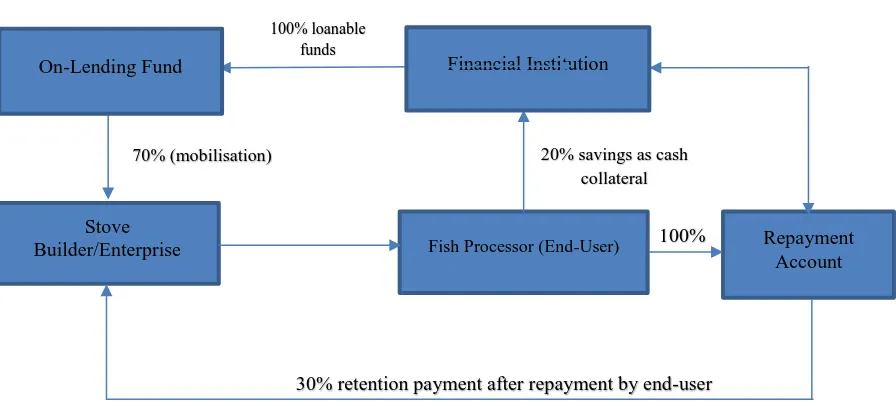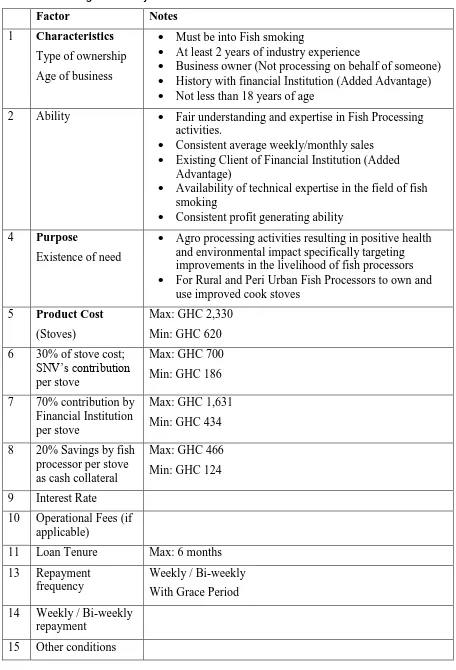SUSTAINABLE FISHERIES
MANAGEMENT PROJECT (SFMP)
Improved Stove Financing Scheme
This publication is available electronically on the Coastal Resources Center’s website at
http://www.crc.uri.edu/projects_page/ghanasfmp/
For more information on the Ghana Sustainable Fisheries Management Project, contact:
USAID/Ghana Sustainable Fisheries Management Project Coastal Resources Center
Graduate School of Oceanography University of Rhode Island
220 South Ferry Rd.
Narragansett, RI 02882 USA
Tel: 401-874-6224 Fax: 401-874-6920 Email: [email protected]
Citation: Avega, B. Kwarteng E, (2016). Improved Stove Financing Scheme Report. The USAID/Ghana Sustainable Fisheries Management Project (SFMP), Coastal Resources Center, Graduate School of Oceanography, University of Rhode Island. Narragansett, RI. and SNV Netherlands Development Organisation GH2014_ACT066_SNV 9p.
Authority/Disclaimer:
Prepared for USAID/Ghana under Cooperative Agreement (AID-641-A-15-00001), awarded on October 22, 2014 to the University of Rhode Island, and entitled the USAID/Ghana Sustainable Fisheries Management Project (SFMP).
ii
Detailed Partner Contact Information:
USAID/Ghana Sustainable Fisheries Management Project (SFMP) 10 Obodai St., Mempeasem, East Legon, Accra, Ghana
Telephone: +233 0302 542497 Fax: +233 0302 542498
Maurice Knight Chief of Party [email protected]
Kofi Agbogah Senior Fisheries Advisor [email protected] Nii Odenkey Abbey Communications Officer [email protected]
Bakari Nyari Monitoring and Evaluation Specialist [email protected] Brian Crawford Project Manager, CRC [email protected]
Justice Odoi USAID Administrative Officer Representative [email protected] Kofi.Agbogah
SNV Netherlands Development Oganization #161, 10 Maseru Road,
E. Legon, Accra, Ghana 233 30 701 2440
Donkris Mevuta Kyei Yamoah
[email protected] Friends of the Nation Parks and Gardens Adiembra-Sekondi, Ghana 233 312 046 180
Peter Owusu Donkor Spatial Solutions
[email protected] #3 Third Nautical Close,
Nungua, Accra, Ghana 233 020 463 4488
Thomas Buck
SSG Advisors 182 Main Street
Burlington, VT 05401 (802) 735-1162
Victoria C. Koomson
[email protected] CEWEFIA
B342 Bronyibima Estate Elmina, Ghana
233 024 427 8377
Lydia Sasu
Darkuman Junction, Kaneshie Odokor Highway
Accra, Ghana 233 302 315894
Gifty Asmah
[email protected] Daasgift Quality Foundation
Headmaster residence, Sekondi College Sekondi, Western Region, Ghana 233 243 326 178
For additional information on partner activities: CRC/URI: http://www.crc.uri.edu
CEWEFIA: http://cewefia.weebly.com/
DAA: http://womenthrive.org/development-action-association-daa Daasgift:
https://www.facebook.com/pages/Daasgift-Quality-Foundation-FNGO/135372649846101 Friends of the Nation: http://www.fonghana.org Hen Mpoano: http://www.henmpoano.org
SNV: http://www.snvworld.org/en/countries/ghana SSG Advisors: http://ssg-advisors.com/
ACRONYMS
CCM Centre for Coastal Management
CEWEFIA Central and Western Region Fishmongers Improvement Association CRC Coastal Resource Center
CSLP Coastal Sustainable Landscape Project DAA Development Action Association
DFAS Department of Fisheries and Aquatic Science DMFS Department of Marine Fisheries Sciences DQF Daasgift Quality Foundation
FtF Feed the Future
GIFA Ghana Inshore Fishermen's Association GIS Geographic Information System
GNCFC Ghana National Canoe Fishermen’s Council
HM Hen Mpoano
ICFG Integrated Coastal and Fisheries Governance MESTI Ministry of Environment Science and Technology MOFAD Ministry of Fisheries and Aquaculture Development NDPC National Development Planning Commission
NGOs Non-Governmental Organizations
SFMP Sustainable Fisheries Management Project SMEs Small and Medium Enterprises
SNV Netherlands Development Organization
SSG SSG Advisors
STWG Scientific and Technical Working Group UCC University of Cape Coast
URI University of Rhode Island
iv
TABLE OF CONTENTS
CONTENTS
ACRONYMS ... iii
TABLE OF CONTENTS ... iv
LIST OF FIGURES ... iv
LIST OF TABLES ... iv
INTRODUCTION ... 1
SCOPE OF PARTNERSHIP ... 1
LIST OF FIGURES
Figure 1 The Partnership Model for the Incentive Period (Dealer Financing) ... 2Figure 2 Actual Partnership Model ... 2
INTRODUCTION
The Netherlands Development Organisation (SNV) is an implementing partner of the Sustainable Fisheries Management Project (SFMP) which is being funded by the United States Agency for International Development (USAID) and implemented by the Coastal Resource Center (CRC) of the University of Rhode Islands (URI) through a consortium of local partners.
SNV is a Netherlands based International Development Organisation. It works in three sectors, Agriculture, Renewable Energy and Water Sanitation and Hygiene.
The Sustainable Fisheries Management Project (SFMP) is a 5-year fisheries food security project funded by the United States Agency for International Development (USAID), under the Mission’s Feed the Future (FtF) Programme. The project seeks to rebuild targeted marine fisheries stocks (small pelagics - such as herrings, mackerel, anchovies and sardinella - which are important to local food security and supports livelihoods) through the adoption of sustainable fishing practices.
The SFMP is a follow-on to a previous fisheries program –Integrated Coastal and Fisheries Governance Initiative which was implemented in coastal Western Region. This new project – SFMP- is, national in scope and contributes to the Government of Ghana’s Fisheries and Agricultural Sector development objectives and the USAID FtF Development Objectives to reduce poverty and hunger.
The project seeks to benefit 10,000 fishers within the project period. As part of interventions, SNV is leading a scale up plan for promoting improved fish smoking stoves in the coastal regions of Ghana, especially the Central and Western Regions. The pivot of the stove promotion program is the financial vehicle, thus the need to establish relationships with financial Institutions. SNV is carrying out this intervention in partnership with two other implementing partners of the Project; CEWEFIA, located at Elmina and Development Action Association (DAA).
SCOPE OF PARTNERSHIP
This intervention involves the installation of improved stoves to interested fish processors (smokers) at a cost subsidy of 30% for the first 50 early adopters after which all adopters acquire the stove at its original price. The main stakeholders that will be involved in this partnership is SNV and the project partners who will carry out awareness creation campaigns, on one side, the financial institution, the stove company and the beneficiary. The roles are explained in Table 2 below.
The concept is to run a revolving fund; into which SNV, the financial institution and the beneficiary makes contributions. The financial institution’s contribution is considered as a loan for fish processor. The financial institutions remain the custodian and manager of the funds on behalf of all the parties. An agreed percentage of the fund (about 70%) of the cost of the stove will be paid to the stove company before the installation the stoves. When the stove company completes the installation of the stoves and the beneficiaries use it for a month without issues, then the final balance of the stove cost will be paid to the company. The payment to the stove company is considered a loan to the beneficiaries which will be paid back within the terms of the financial institution.
To start up the partnership, SNV will publish a request of Interest (RFP), to which the financial institution will respond with a letter of Interest to partner with the project. This will be followed up with a contract between SNV and the financial institution. SNV will also facilitate a follow up contract between the financial institution and the stove company. The partnership will start with an initial 50 stoves allocation, after which the numbers will be renewed depending on prevailing outcomes of the first phase.
The 70% contribution (loan) from the financial institution is the only amount that will attract interest. The 20% savings from the fish processor will accrue interest.
Figure 1 The Partnership Model for the Incentive Period (Dealer Financing)
30% retention payment after repayment by end-user
SNV
On-Lending Fund Financial Institution
Stove
Builder/Enterprise Fish Processor (End-User) Repayment Account 70% loanable
funds
70% (mobilisation)
30% incentive funds
70%
20% savings as cash collateral
Figure 2 Actual Partnership Model
30% retention payment after repayment by end-user On-Lending Fund Financial Institution
Stove
Builder/Enterprise Fish Processor (End-User) Repayment
Account 100% loanable
funds
70% (mobilisation)
100%
20% savings as cash collateral
The 100% contribution (loan) from the financial institution will attract interest while the 20% savings from the fish processor will accrue interest.
Table 1 Financing Product Dynamics
Factor Notes
1 Characteristics Type of ownership Age of business
Must be into Fish smoking
At least 2 years of industry experience
Business owner (Not processing on behalf of someone)
History with financial Institution (Added Advantage)
Not less than 18 years of age
2 Ability Fair understanding and expertise in Fish Processing activities.
Consistent average weekly/monthly sales
Existing Client of Financial Institution (Added Advantage)
Availability of technical expertise in the field of fish smoking
Consistent profit generating ability 4 Purpose
Existence of need
Agro processing activities resulting in positive health and environmental impact specifically targeting improvements in the livelihood of fish processors
For Rural and Peri Urban Fish Processors to own and use improved cook stoves
5 Product Cost
processor per stove as cash collateral
Max: GHC 466 Min: GHC 124 9 Interest Rate
10 Operational Fees (if applicable)
11 Loan Tenure Max: 6 months 13 Repayment
frequency
Weekly / Bi-weekly With Grace Period 14 Weekly / Bi-weekly
4
Table 2 Roles and Responsibilities of Stakeholders involved in this Partnership
SNV’s Responsibilities Financial Institution Responsibilities -Contributes 30% of the total fund value to
the On-lending Fund
- Provide early adopters incentive of 30% for the first 50 beneficiaries.
-Provide technical assistance to Financial Institution on financial product development -Facilitate the certification of the improved cookstoves
-Ensure stove companies build stove to specification and standards and training financial institutions to carry out this activity
-Carries out awareness creation with partners and provide demand for the improved stoves
-Provide capacity building to End-Users (Fish Processors) on small business management.
-Fund Manager and Custodian to the on-lending fund
-Manages the loan repayment accounts -Contributes 70% of the total funds to the on-lending funds
-Sign direct contract with the Stove Builder/Enterprise
-Opens an account for the Stove Builder/Enterprise
-Advance 70% of the total cost of the improved stove to the Stove Builder/Enterprise
-Retain 30% of the cost of the improved cookstove on behalf of the stove
builder/Enterprise.
-Sign loan agreement with the end-users
-Collect repayment of loan granted to end-users
Stove Builder/Enterprise Fish Processor (End-User) -Open and maintain accounts with the
Financial Institution.
-Build stove to standard specifications -Train end-users on stove maintenance, heating, use and safety
-Ensure quality materials are used in building stoves
-Open and maintain accounts with the Financial Institution
-Deposit 20% of the total loan amount as cash collateral (upfront payment).
-Make weekly/daily/monthly loan repayment as agreed with the financial institution

